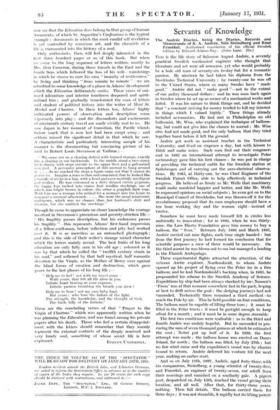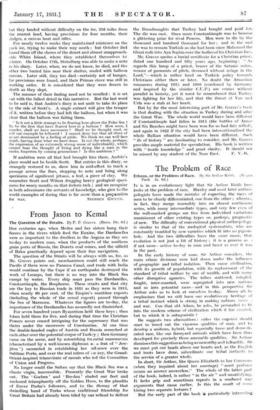Servants of Knowledge
The Andree Diaries, being the Diaries, Records and Memoranda of S. A. Andree, Nils Strindberg and Knut Fraenkel. Authorised translation of the official Swedish edition by Edward Adams-Ray. (John Lane. 21s.) Tills is the life story of Salomon August Andree, a severely practical Swedish mechanical engineer who thought that
literature and art were all nonsense, yet who would probably be a hale old man of seventy-six to-day but for a romantic passion. By nineteen he had taken his diploma from the Stockholm Technical University ; by twenty-one he was off to the United States, where so many Swedes have "made good." Andree did not make good "—not to the extent of one paltry thousand dollars : and he was soon back again in Sweden where he set up as owner of a mechanical works and failed. It was his nature to think things out, and he decided that" a constant striving for money tended to kill my interest in things which I valued highly." These things already included aeronautics. He had met in Philadelphia an old balloonist, Mr. Wise, who explained the technique of balloon- ing, but could not give him the chance to ascend : Mr. Wise also had not made good, and the only balloon that they tried together burst before it left the ground.
Andree got work as assistant teacher in the Technical University, and lived on sixpence a day, but with leisure to think and make notes. Such men find out their congeners and in 1882 an international attempt to investigate Polar meteorology gave him his first chance : he was put in charge of providing the technical outfit for the Swedish station at Spitzbergen and of carrying out the aero-electrical observa- tions. By 1885, at thirty-one, he was Chief Engineer of the Swedish Patent Office, able to help effectively in technical progress. He believed as firmly as Mr. Wells that machinery could make mankind happier and better, and like Mr. Wells he expressed opinions on social subjects ; he even got on to the Municipal Council of Stockholm, but was thrown off it for the revolutionary proposal that its men employees should have a ten hour working day and the women eight—instead of twelve.
Somehow he must have made himself felt in circles less unfriendly to innovation ; for in 1893. when he was thirty- nine, the Lam Hierta Foundation gave him money to buy a balloon, the " Svea." Between July 1893 and March 1895, Andree carried out nine flights, each time single handed : but from the first journey he had formed his conclusion that for scientific purposes a crew of three would be necessary. On the third ascent he was blown out to sea but managed a landing in the Finnish Archipelago.
These experimental flights attracted the attention, of the veteran Arctic explorer, Nordenskiold, to whom Andree opened up his project of flying over the Polar ice in a free balloon; and he had Nordenskiold's backing when, in 1895, he propounded his scheme to the Swedish Academy of Science. Expeditions by ship had been always checked by ice: Nansen's • Fram' was at that moment somewhere fast in the pack, hoping at best to drift across the goal ; the sledging journeys had not succeeded. Technically there remained a third method—to reach the Pole by air. This he held possible on four conditions. The balloon must be capable of lifting three tons ; it must be filled in the Polar tracts ; it must be gastight enough' to keep afloat for a month ; and it must be in some degree steerable.
The first two conditions were realisable : as to the third and fourth Andree was unduly hopeful. But he succeeded in pro- curing the sum of seven thousand guineas at which he estimated the cost ; Nobel put up half of it. In 1896, the first attempt was made ; the balloon house was erected on Danes Island, far north ; the balloon was filled, by July 27th; but no fair wind came and the expedition's vessel was by charter bound to return. Andree deferred his venture till the next year, making an earlier start.
And so on July 11th, 1897, Andree, aged forty-three, with his companions, Strindberg, a young scientist of twenty-five. and Fraenkel, an engineer of twenty-seven, cut adrift from their moorings and vanished on a southerly gale. A pigeon post, despatched on July 13th, reached the vessel giving their location, and all well. After that, for thirty-three years, nothing. Then full details. The balloon carried them for three days, it was not steemble, it rapidly lost its lifting power: but they landed without difficulty on the ice, 216 miles from the nearest land, having provisions for four months, their sledges, a canvas boat and rifles.
For nearly twelve weeks they maintained existence on the pack ice, trying to make their way south ; but October 2nd found them off the shores of the desert and almost unapproach- able White Island, where they established themselves to winter. On October 17th, Strindberg was able to make a note in his diary. Later, when, we do not know, he died, and the other two buried him near their shelter, roofed with balloon canvas., Later still, they too died—certainly not of hunger, for provisions were found, and their Primus stove was still in working order. It is considered that they were frozen to death as they slept.
The manner of their finding need not be recalled : it is set out with the fullest detail in this narrative. But the last word to be said is, that Andree's diary is not unfit to take its place by the side of Scott's. A single extract will give the temper of it, written before they had left the balloon, but when it was clear that the balloon was failing them.
"Is it not a little strange to be floating here above the Polar Sea ? To be the first that have floated here in a balloon ? How soon, I wonder, shall we have successors ? Shall we be thought mad, or will our example be followed ? I cannot deny but that all three of us are dominated by a feeling of pride. We think we can well face death, having done what we have done. Is not the whole, perhaps, the expression of an extremely strong sense of individuality, which cannot bear the thought of living and dying like a man in the ranks, forgotten by coming generations ? Is this ambition ? "
If ambition were all that had brought him there, Andree's place would not be beside Scott. But entries in this diary, so strangely restored to us, show him in mid-effort to track a passage across the floes, stopping to note and bring along specimens of significant jetsam, a leaf, a piece of clay. We remember Scott and Wilson dragging heavy geological speci- mens for weary months on that forlorn trek ; and we recognize in both adventures the servants of knowledge, who give to the world examples of daring that is far more than a preparation





































 Previous page
Previous page